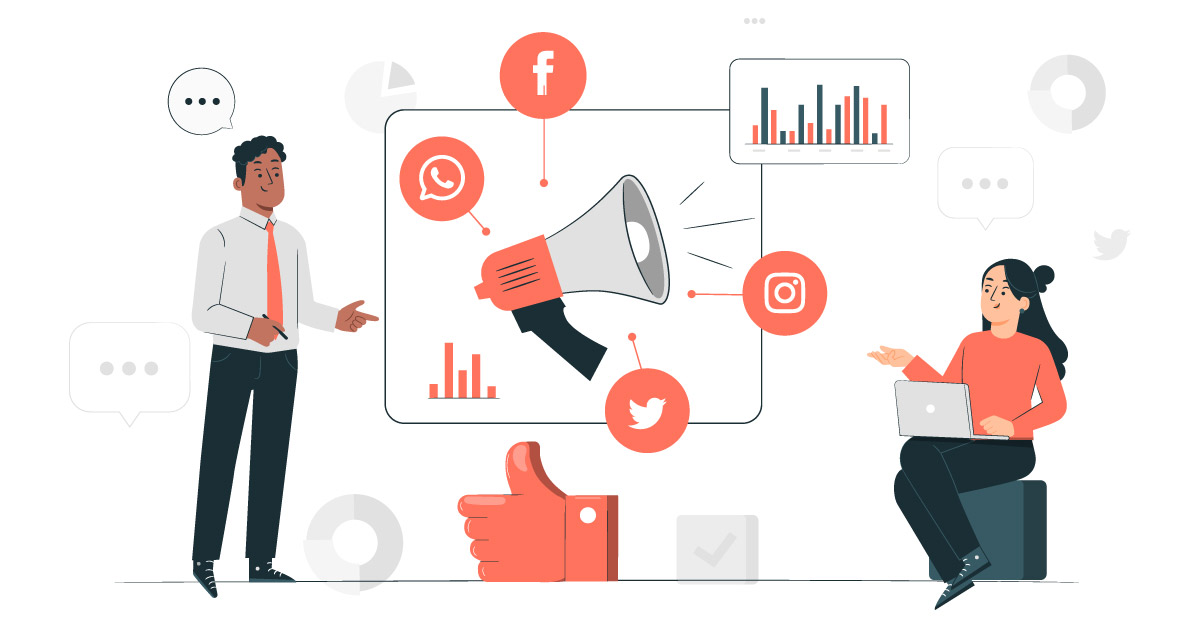
Mastering B2B Marketing in 2024: Your Comprehensive Guide
Finding the right B2B marketing strategies to connect with, engage, and convert your target audience can be more challenging than it sounds.
Like B2C consumers, B2B enterprises are constantly emerging, embracing new trends, and prioritizing different aspects. This means business leaders need to remain innovative and informed to maintain a competitive edge, or they should take the guidance of a B2B marketing professional.
Although there are many approaches to promoting products and services in B2B services, from content marketing to influencer marketing, not all strategies provide equal results.
This blog will explore emerging trends and identify the most effective B2B marketing strategies companies should focus on.
Table of Contents
What is B2B Marketing?
B2B marketing includes various activities to promote products or services to other businesses. Unlike business-to-consumer (B2C) marketing, where the target audience is individual consumers, B2B marketing targets organizations and decision-makers within those organizations. This often involves longer sales cycles, multiple stakeholders, and a focus on building relationships rather than making quick transactions.
8 Top B2B Marketing Strategies
- Content Marketing dominates the B2B world. Businesses can grow as industry leaders and attract potential users by creating valuable and informative content such as blog posts, whitepapers, and case studies. Content marketing is about providing value to your audience, addressing their pain points, and positioning your company as the solution.
- Search Engine Optimization: In today’s digital world, establishing a robust online presence is paramount to success in B2B operations. SEO techniques help companies enhance their visibility in search engine results, making it easier for potential users to find them. By optimizing their website, creating quality content, and earning backlinks from reputable sources, B2B companies can boost their search rankings and attract qualified leads.
- Email Marketing: Despite the advancement of social media and other digital marketing channels, email is still a powerful tool for B2B marketers. Email marketing allows businesses to nurture leads, communicate with customers, and deliver targeted messages directly to their inboxes. By segmenting their email lists, personalizing their messages, and providing valuable content, B2B companies can drive engagement and conversions.
- Social Media Marketing: While B2B companies may not rely on social media to the same extent as their B2C counterparts, platforms like LinkedIn, Twitter, and Facebook still play a vital role in their marketing strategy. Social media allows companies to connect with industry influencers, engage with prospects, and showcase thought leadership. By sharing relevant content, participating in industry conversations, and building a strong brand presence, B2B marketers can use social media to generate leads and foster relationships.
- Account-Based Marketing (ABM): ABM is a strategic approach to effective B2B marketing, focusing on high-value accounts. Through personalized and targeted marketing initiatives, enterprises can adeptly engage with key decision-makers and influencers within these accounts. The advantages of ABM include increased return on investment (ROI), improved customer relationships, and enhanced synergy between sales and marketing teams.
Adopting ABM enables businesses to hone their marketing endeavors more precisely, harnessing insights from platforms like Google Analytics. This, in turn, fosters elevated conversion rates and enduring prosperity.
- Customer Experience (CX) Marketing: Delivering a positive customer experience is paramount in B2B. In the realm of B2B transactions, purchasers anticipate tailored, seamless interactions at each stage, spanning from the first encounter to ongoing post-sale assistance. By prioritizing customer experience and investing in tools and processes that streamline the buyer’s journey, B2B companies can differentiate themselves from the competition and foster long-term loyalty.
- Create a Mobile App: Mobility is emerging within B2B companies. With the emergence of hybrid work setups and virtual assistants, many businesses are conducting research on their smartphones while on the go. Developing a mobile app could present a fantastic opportunity to capitalize on this trend.
Approximately 78% of B2B companies now recognize the significance of B2B e-commerce mobile apps and mobile devices for their industry’s future. You can leverage your apps to enhance engagement, foster repeat sales, and unlock fresh opportunities.
- Influencer Marketing: Engaging with influencers is often associated with B2C advertising. However, B2B influencer marketing holds significant value as well. On average, lead generation campaigns endorsed by micro-influencers on LinkedIn yield a conversion rate of up to 20%.
Influencer marketing initiatives are an exemplary method for B2B brands to showcase their credibility to companies that may not be familiar with them yet. Collaborating with a renowned expert within your industry portrays your brand as more trustworthy and dependable.
Furthermore, companies considering this approach need not allocate substantial budgets for working with prominent celebrities or CEOs, as micro-influencers have demonstrated their effectiveness.
Types of B2B Marketing
B2B marketing includes various tactics and techniques, each suited to different objectives and target audiences. Some common types of B2B marketing include:
- Trade Shows and Conferences allow businesses to showcase their products or services, network with industry peers, and generate leads.
- Direct Mail: Despite the relevance of digital marketing, it can still be an effective way to reach B2B decision-makers, especially when personalized and targeted.
- Account-Based Marketing (ABM): ABM involves targeting specific accounts with personalized marketing efforts to drive engagement and conversion.
- Digital Advertising: From search ads to display ads to social media ads, digital advertising allows companies to reach their target audience online and generate traffic to their website or landing pages.
Examples of B2B Marketing Helping Businesses Grow
- HubSpot: A leading supplier of sales software and inbound marketing, it is a prime example of successful B2B marketing. Through content marketing, SEO, and inbound methodologies, HubSpot has attracted millions of visitors to its website, converted many of them into leads, and grown into a multi-billion-dollar company.
- Salesforce: Salesforce, a cloud-derived customer relationship management (CRM) platform, is another B2B marketing success story. Through thought leadership, customer advocacy, and strategic partnerships, Salesforce has become identical to CRM and transformed how businesses manage customer relationships.
Conclusion
B2B marketing is a complicated discipline that requires careful planning, creativity, and execution. By leveraging the right strategies and tactics, businesses can attract, engage, and convert their target audience, driving growth and success in the competitive B2B landscape. Whether through content marketing, SEO, email marketing, or account-based marketing, the key is understanding your audience, delivering value, and building lasting relationships that drive results. With the right approach, B2B marketing can be a powerful driver of business growth and profitability.






